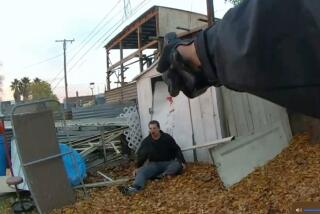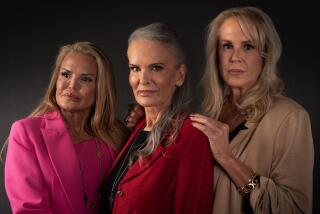A Turbulent Relationship Ends in Tragedy for Family
- Share via
CANYON COUNTRY — This time, Carolina Brown was leaving for good.
And this time, her husband believed her.
Authorities say Robert Brown, despondent over the impending separation, set an explosive gasoline fire on Sept. 6--killing himself, his 26-year-old wife and their two young children.
The fire followed a years-long tangle of emotional separations and reunions between Robert and Carolina. Their relationship began with love in El Salvador, and ended in fear and deceit in a Canyon Country apartment. It was fraught with problems--his temper and jealousy and her dissatisfaction, according to interviews with friends, co-workers and police.
“When he got mad, he changed into another person,” said Ichrak Aiachi, a friend of the couple. “She said he’d threaten to kill her. . . . [But] we didn’t believe it. We didn’t see that.”
Together, Robert and Carolina were a contrast of cultures: She was a Latina immigrant, he an African American. She could hear, he was deaf. Both had developed strong personalities. He had learned to survive in a world of near silence, she grew up with the sounds of war in El Salvador.
They were also loving parents and hard workers. Robert had the graveyard shift sorting packages at United Parcel Service. She was a nanny turned grocery store clerk.
But after years of fighting, of indecision over leaving the father of her children, Carolina had found a new motivation for starting a new life: another man.
So in the last days of her life, Carolina worked at the Food 4 Less in North Hollywood, looking forward to moving her children, Kimberly, 3, and Robert Jr., 11 months, to a new apartment. She had told friends she was finally going to divorce her husband.
“She wanted to move on with her life,” said Sylvia Cable, a friend and co-worker at Food 4 Less. “Sometimes she’d say that she didn’t know what to do about him, that no matter what, he was the father of her children. But she was going to leave him.”
Experts say Carolina had entered the most dangerous period for abused women--the time between making the decision to leave and moving out.
“This is really a typical pattern,” said Betty Fisher, executive director of Haven Hills, which runs a shelter for abused women in the San Fernando Valley. “Once the man knows she’s getting out of his control, he escalates his attempts to keep her.”
Braving his response, Carolina told Robert last month that she was planning to leave. Shortly afterward, on Aug. 21, he flew into a rage and threatened to kill her and himself. Police were called to their Manzanita Lane apartment, and Robert spent three days in a hospital for a psychiatric evaluation.
After being released, Robert grew more and more despondent, friends said. He told a neighbor about his personal problems, scribbling on a paper bag to communicate.
But he was also concerned enough about his future to find a second roommate to share expenses with himself and another man already living in the apartment.
Friends say Robert was a devoted father. Neighbors often saw him playing with his kids in the apartment complex pool, his daughter communicating in sign language. In the evenings, the two would go out and watch the MetroLink commuter train stopping across the street.
He loved basketball and played on a team of hearing-impaired players. He was friendly with neighbors and had a small circle of deaf friends who visited often.
“He loved his wife and he loved his kids,” said a hearing-impaired friend, standing outside the charred apartment now covered in wooden boards.
But Robert was also deeply saddened--and angry--that Carolina was leaving.
“It broke his heart,” the friend said.
Carolina did not come to her decision easily.
As a nanny working in Beverly Hills and Calabasas, Carolina cared for other people’s children, cleaned their houses and was said to be punctual and reliable.
Her employers, who sat with Carolina over coffee while babies napped, said she sometimes could not hide her troubles.
“There was a sadness about her,” said Kelly Surrey, who hired Carolina three years ago in Beverly Hills. “I got the impression she had lived beyond her chronological years.”
Monica Neighbors, who hired Carolina two years ago in Calabasas, said, “She told me he would get violent when he drank. But she never told me he hit her. She always said she loved him.”
Carolina began to speak more openly about her domestic problems two years ago after the Browns moved to Chicago, Robert’s hometown. They moved in with Robert’s relatives.
But Carolina and her daughter returned three months later. Separated from her sister and brother, Carolina felt isolated and lonely. One particularly violent episode finally sent her fleeing back to California.
“He had been drinking and he was way out of control, not even his brothers could control him,” said Neighbors, who spoke to Carolina when she returned.
She didn’t tell her friends right away that she had returned without Robert.
“She was embarrassed to be back,” said one friend. “She knew everyone would say that she shouldn’t ever go back to him.”
Carolina soon found domestic work again in Calabasas.
“I can’t tell you the number of times we sat at my kitchen table and talked about this,” said the employer, who did not want to be identified to protect her young daughter from learning of Carolina’s death. “To me, he [Robert] sounded extremely immature, extremely incapable of dealing with a mature, committed relationship.”
Robert soon returned to Los Angeles, to Carolina and Kimberly. They lived together in a Panorama City apartment, and once again the couple’s squabbles began.
Once last year, Los Angeles police were called to the couple’s apartment after Carolina reported Robert had struck her.
She left him again, and moved in with relatives. He would call her every day, using a special device for the deaf.
“I was really hoping she would stay strong and hold to her resolve and not capitulate and go back to the way it was,” said Carolina’s employer at the time, who keeps some of her drawings and handmade jewelry.
Carolina told her employer that she met Robert in El Salvador, where he was visiting. They began living together in the United States eight years ago. Carolina spoke English well, and had sought answers in therapy over the years.
But shortly after calling for help from police last year and moving out, Carolina returned to Robert, who was now living in the Canyon Country apartment. This time, she got pregnant.
“She wanted so badly to have a happy family life,” said her employer. “It was this myth-making that went on inside her head. She had such a desire for a certain scenario.”
After her son was born Sept. 19, she took time off from work to raise her daughter and care for her newborn.
In January, she began working as a clerk at Food 4 Less in Panorama City. There, she met a man who she believed would take Robert’s place in her children’s hearts. He had already won hers. The man declined to be interviewed for this story.
“She wanted them [her children] to call him Daddy,” one friend said.
Carolina transferred to the North Hollywood branch of the grocery chain, quickly earning the praise of co-workers who sometimes could not help but notice the sadness in her young face.
“One time she told me her life was miserable but the only thing that kept her going was her children,” said Paul Guillen, a store employee.
Carolina did not want others to know she had moved back in with Robert.
“I think she was only living with him because it was convenient,” said co-worker Cable. “All this time, she told us she had a roommate.”
Cable and other friends believe Carolina was only days away from making her final break from Robert, saving up the last money she needed to strike out on her own.
Her goal in life was clear, written on a job application she had filled out last year.
“To be the best mother for my kids,” she wrote.
More to Read
Sign up for Essential California
The most important California stories and recommendations in your inbox every morning.
You may occasionally receive promotional content from the Los Angeles Times.










